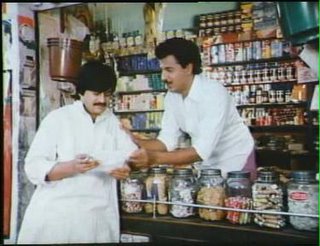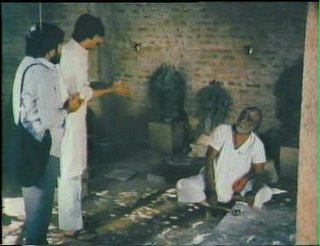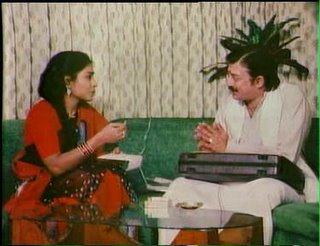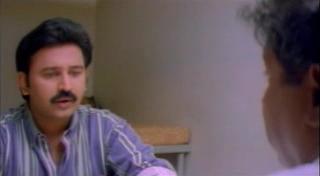 O Mallige (1997)
O Mallige (1997) Featuring: Ramesh, Charulata, Amar Mayur, Chaitali and others.
Directed by: V.Manohar
Kannada movie industry’s well known music director V.Manohar chooses an interesting story to launch himself as a director. “O Mallige” has shades of a lot of features that have dealt with similar themes in various languages – the well known and my personal favorite being Kamal Hasan and Sridevi’s dynamite feature ‘Sadma’ – but gives it a different treatment.
Mallige (Charulata) lives in a small village with her uncle played by V.Manohar himself. A heart patient, Manohar has an ambitious wannabe model in his son Nacchi (Amar Mayur) who is lost in the bliss of the big city. When he suffers another nearly fatal stroke, Nacchi reluctantly returns to be by his dying father’s side. Seizing the opportunity, the dying man manages to knot the innocent village belle Mallige to our dear city chap. As much as Nacchi hates the decision, he goes along considering his father’s health. He even manages to consummate the wedlock under the influence of alcohol. A few days later the old man dies leaving the helpless girl to his son. The very next day Nacchi takes off without a care in the world for the newly wed and naïve girl who has nowhere to turn for support.
Days roll by and soon Mallige realizes she is expecting. To take things under her own control she decides to join her absconding husband in the city. As one would predict our opportunist young man has shifted base and is shown wooing the rich daughter of a millionaire to fuel his aspirations of becoming a successful model. Soon the young couple is shown exchanging sweet nothings in parks and restaurants while the pregnant girl is roaming the streets of the city looking for her ignorant husband.
take things under her own control she decides to join her absconding husband in the city. As one would predict our opportunist young man has shifted base and is shown wooing the rich daughter of a millionaire to fuel his aspirations of becoming a successful model. Soon the young couple is shown exchanging sweet nothings in parks and restaurants while the pregnant girl is roaming the streets of the city looking for her ignorant husband.
Towards intermission we are introduced to the real powerhouse of the feature in the form of Krishna Murthy alias Kitti (Ramesh) who is also an aspiring model in between odd jobs. An accident brings Kitti and Mallige together as she is seriously injured in the mishap and loses all memory of her immediate past. For his convenience to shoo off the prying landlords, Kitti brings Mallige to his house and christens her Lakshmi since she has no memory of her name. A special bond of affection starts forming between the two. Nacchi continues his Casanova ways with the rich girl unaware of any of these happenings.
Time continues to roll by and before we know it Lakshmi aptly bears Ganesha. Meanwhile Kitti manages to get a plum offer from the same firm that works with Mallige’s husband. Soon the jig is up for Mr.Big-Dreams Nacchi as his girlfriend realizes that he is married and so starts encouraging Kitti instead to get back at him. Nacchi confronts her and ends up apologizing for his “mistake” but she is firm in her decision and decides not to have anything to do with him.
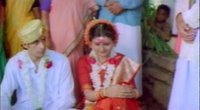 Things start falling into place when she sees Mallige at Kitti’s place and informs him about the truth. Kitti is heartbroken at the thought of losing Mallige to a stranger. She has been his life for the past few years and this sudden change of events scares him. As the movie turns more predictable Nacchi meets his long lost wife in Kitti’s house and confronts him to return her to him. Now Mallige alias Laxmi is shown to have to choose between the two men although I never saw the relevance considering the “real husband” had no role in Laxmi’s life expect the marriage and its consummation. The final showdown sees Laxmi undergoing medical treatment in the process of gaining her memory back. Who she chooses to be with and under what circumstances forms the final few minutes of the movie.
Things start falling into place when she sees Mallige at Kitti’s place and informs him about the truth. Kitti is heartbroken at the thought of losing Mallige to a stranger. She has been his life for the past few years and this sudden change of events scares him. As the movie turns more predictable Nacchi meets his long lost wife in Kitti’s house and confronts him to return her to him. Now Mallige alias Laxmi is shown to have to choose between the two men although I never saw the relevance considering the “real husband” had no role in Laxmi’s life expect the marriage and its consummation. The final showdown sees Laxmi undergoing medical treatment in the process of gaining her memory back. Who she chooses to be with and under what circumstances forms the final few minutes of the movie.
Performances wise Ramesh is the only trained professional in the feature who keeps the story alive. His natural flair for expressions brings a much needed realistic look to the script. The only downside seemed to be his casting as the male fashion model since I thought it did not really fit him. Charulata does a good job with her character with a lot of screen presence. Amar Mayur, debuting with this feature apparently, is a complete let down. The man is camera conscious, wooden-faced and out of sync with the lines in many places. The story could have used a seasoned actor for his role and thus ends up losing some luster. Sadhu Kokila is supposedly the comic component but ends up overacting his way around like always. Others chip in as appropriate in their stereotypical roles.
The real weight in the feature in terms of execution is the post intermission section. Manohar does a decent job at stitching together a cohesive script although random patches of needless comedy throws the narration off balance. Being a music director an overdose of songs seems irrelevant since they add less mileage to the story telling process. They are definitely melodious nonetheless and are pleasing to the ears. Editing seems rushed and abrupt so could have used some work.
A good movie with a fine theme.

Mallige (Charulata) lives in a small village with her uncle played by V.Manohar himself. A heart patient, Manohar has an ambitious wannabe model in his son Nacchi (Amar Mayur) who is lost in the bliss of the big city. When he suffers another nearly fatal stroke, Nacchi reluctantly returns to be by his dying father’s side. Seizing the opportunity, the dying man manages to knot the innocent village belle Mallige to our dear city chap. As much as Nacchi hates the decision, he goes along considering his father’s health. He even manages to consummate the wedlock under the influence of alcohol. A few days later the old man dies leaving the helpless girl to his son. The very next day Nacchi takes off without a care in the world for the newly wed and naïve girl who has nowhere to turn for support.
Days roll by and soon Mallige realizes she is expecting. To
 take things under her own control she decides to join her absconding husband in the city. As one would predict our opportunist young man has shifted base and is shown wooing the rich daughter of a millionaire to fuel his aspirations of becoming a successful model. Soon the young couple is shown exchanging sweet nothings in parks and restaurants while the pregnant girl is roaming the streets of the city looking for her ignorant husband.
take things under her own control she decides to join her absconding husband in the city. As one would predict our opportunist young man has shifted base and is shown wooing the rich daughter of a millionaire to fuel his aspirations of becoming a successful model. Soon the young couple is shown exchanging sweet nothings in parks and restaurants while the pregnant girl is roaming the streets of the city looking for her ignorant husband.Towards intermission we are introduced to the real powerhouse of the feature in the form of Krishna Murthy alias Kitti (Ramesh) who is also an aspiring model in between odd jobs. An accident brings Kitti and Mallige together as she is seriously injured in the mishap and loses all memory of her immediate past. For his convenience to shoo off the prying landlords, Kitti brings Mallige to his house and christens her Lakshmi since she has no memory of her name. A special bond of affection starts forming between the two. Nacchi continues his Casanova ways with the rich girl unaware of any of these happenings.
Time continues to roll by and before we know it Lakshmi aptly bears Ganesha. Meanwhile Kitti manages to get a plum offer from the same firm that works with Mallige’s husband. Soon the jig is up for Mr.Big-Dreams Nacchi as his girlfriend realizes that he is married and so starts encouraging Kitti instead to get back at him. Nacchi confronts her and ends up apologizing for his “mistake” but she is firm in her decision and decides not to have anything to do with him.
 Things start falling into place when she sees Mallige at Kitti’s place and informs him about the truth. Kitti is heartbroken at the thought of losing Mallige to a stranger. She has been his life for the past few years and this sudden change of events scares him. As the movie turns more predictable Nacchi meets his long lost wife in Kitti’s house and confronts him to return her to him. Now Mallige alias Laxmi is shown to have to choose between the two men although I never saw the relevance considering the “real husband” had no role in Laxmi’s life expect the marriage and its consummation. The final showdown sees Laxmi undergoing medical treatment in the process of gaining her memory back. Who she chooses to be with and under what circumstances forms the final few minutes of the movie.
Things start falling into place when she sees Mallige at Kitti’s place and informs him about the truth. Kitti is heartbroken at the thought of losing Mallige to a stranger. She has been his life for the past few years and this sudden change of events scares him. As the movie turns more predictable Nacchi meets his long lost wife in Kitti’s house and confronts him to return her to him. Now Mallige alias Laxmi is shown to have to choose between the two men although I never saw the relevance considering the “real husband” had no role in Laxmi’s life expect the marriage and its consummation. The final showdown sees Laxmi undergoing medical treatment in the process of gaining her memory back. Who she chooses to be with and under what circumstances forms the final few minutes of the movie.Performances wise Ramesh is the only trained professional in the feature who keeps the story alive. His natural flair for expressions brings a much needed realistic look to the script. The only downside seemed to be his casting as the male fashion model since I thought it did not really fit him. Charulata does a good job with her character with a lot of screen presence. Amar Mayur, debuting with this feature apparently, is a complete let down. The man is camera conscious, wooden-faced and out of sync with the lines in many places. The story could have used a seasoned actor for his role and thus ends up losing some luster. Sadhu Kokila is supposedly the comic component but ends up overacting his way around like always. Others chip in as appropriate in their stereotypical roles.
The real weight in the feature in terms of execution is the post intermission section. Manohar does a decent job at stitching together a cohesive script although random patches of needless comedy throws the narration off balance. Being a music director an overdose of songs seems irrelevant since they add less mileage to the story telling process. They are definitely melodious nonetheless and are pleasing to the ears. Editing seems rushed and abrupt so could have used some work.
A good movie with a fine theme.




